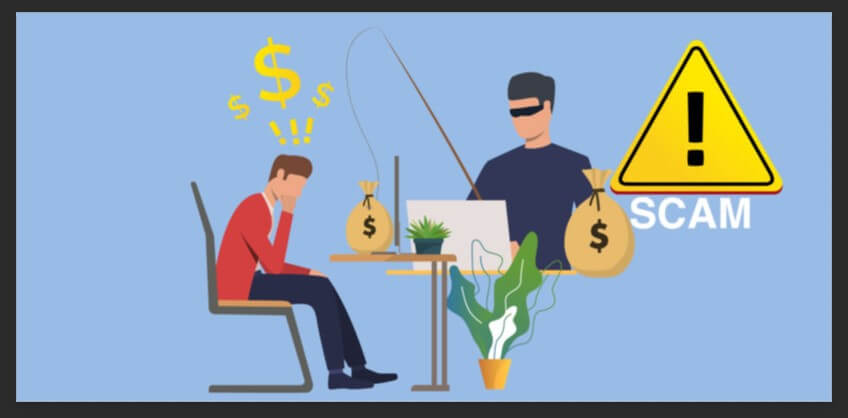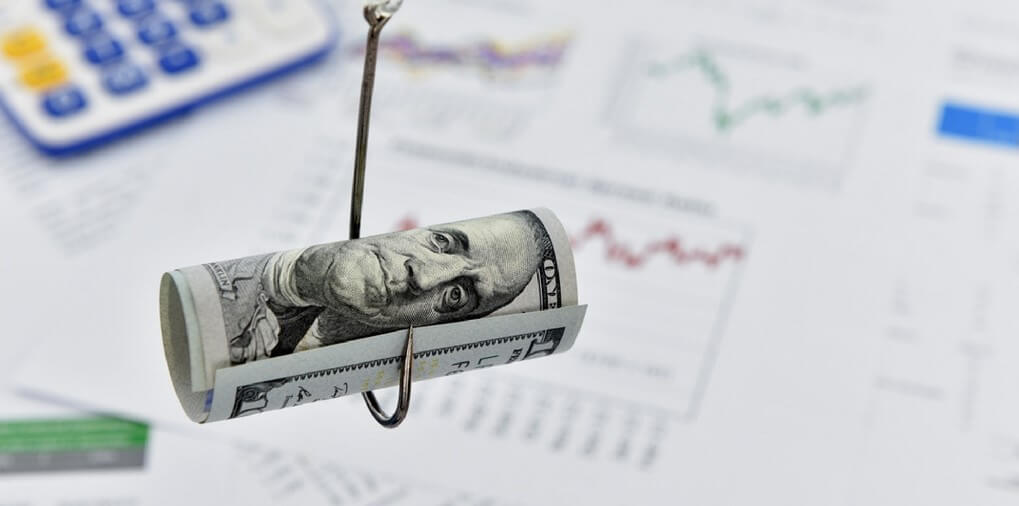What makes us vulnerable to scams and what can we do to make ourselves less vulnerable?
There’s a particular phenomenon out there amongst forex traders, one that we have all seen or even experienced ourselves but that it is worth spending a little bit of time discussing. We all have our vulnerabilities and it doesn’t even matter how long you have been trading, you still have them to some extent. Over time you might shed the ones you started out with – or at least you will probably have learned what they are and how to suppress them – but there’s a good chance you will also gain new ones along the way. Now, for the more seasoned traders among you, this will involve a little trip down memory lane. For those of you who have only been trading for a couple of years, listen up as this will be the kind of knowledge people don’t just share with you every day.
Emotional Rollercoaster
Everyone who has ever gone into forex trading has experienced one of two things at the beginning. Some have lost money right from the get-go – often they’ve everything they put in. Others have arguably had the sharper end of the stick and had some luck to begin with. That can be worse because it gives you a false sense that you know what you’re doing. It gives you the feeling that every decision you make is a stroke of genius and that you’re a natural at this. Either way, it can suck you in, in an emotional sense. Those who’ve won from the start become hooked on that euphoric feeling of getting it right – it’s a feeling like hitting the jackpot or scoring a winning goal or point. It can be very satisfying but also it can mislead you.
Those who’ve lost out most often still want to play but can no longer trust themselves to rake in the money. But that first feeling of having found the solution to a lot of your problems with forex trading – that’s a hard feeling to shake. And so we stick with it and cling on to the hope that we’re going to be able to get back in the game. That hope you feel, that against the odds you will figure this out and that you can find a system that works – that hope can be a useful thing if you don’t let it rule your decisions. It can also be a dangerous thing.
It can be dangerous because there are scammers out there who prey on that hope. Or, to be more precise, they prey on those whose hope has consumed them and turned into desperation. Scammers will do what they can to make you feel like they are your knight in shining armor, riding in to rescue you from your failures and promising big things. For people who are desperate to regain their losses, who feel like they have a mountain of learning to climb and are looking for a shortcut, that message can be irresistible.

Baltimore Stockbroker
There are a great many scams out there and many people and groups looking to run them on anyone they can identify as a potential victim. It might be instructive to take a look at how one of these scams works to get a better understanding of the mechanisms underlying this unscrupulous racket. Now, this particular scam we’re going to examine here more closely goes under several different names, the most popular of which is probably the Baltimore stockbroker but it is also sometimes known as the file drawer problem or the touting pyramid.
It is most commonly run in the sports betting world but it has migrated across to equity, forex, and other kinds of trading and investment. It is also worth bearing in mind that it has many different iterations and variations, so what we’re covering here are just the main principles.
In its most basic form, the scam starts by making outrageous claims through mass emailing or through social media. Sometimes they’re even run as ads or promoted social media content – although it is worth mentioning that most of the larger social media platforms are doing a better and better job of clamping down on these scams and reporting them to the authorities. Nonetheless, they still get through. And we’ve all seen these claims: “Turn just $1,000 into $10,000 with this amazing trading technique!”, “Earn yourself returns of 100% every month!”, “Use this unique trading technique to make 2,000 pips or more!”
Of course, these claims are outrageous and you’d have to be desperate for them to reel you in but that’s just the point. Scammers pulling the Baltimore stockbroker and other similar cons rely on your desperation. Also, it is certainly worth bearing in mind that these examples are pretty basic. Scammers have devised much more sophisticated methods to get these claims across and make them seem both more believable and more legitimate. One such technique is to use real testimonials from people who are marks in the scam but are temporarily doing well out of it. As you will see, for a time some people will be victims of the scam but will have bought into it so deeply that they will sound very genuine when recommending it to others.
Using these tactics the scammer builds up a pool of marks. Often this pool will number tens or even hundreds of people but in order to keep it simple here, let’s say the scammer’s pool is just 16 people. Firstly, the scammer will charge the marks a fixed amount per week or per month to stay in the game. And they buy into it because they have become convinced that they are onto something that will make them that fee back and then some. The scammer then tells the marks that he has some secret, inside information about some future movement of the market. For example, they say they have the lowdown on an upcoming news event and they know which way the market will move as a result. For the sake of this example, let’s say the scammer tells his sixteen marks that he has some information about some news that will affect the EUR/USD pair and he knows which way it will send the price of the dollar against the euro.
Now, here’s the key component. The scammer will use the fact that none of the marks know each other or have any contact with each other to split them into two equal groups – in this case, with eight people in each group. One group receives a prediction that the dollar will go up against the euro in response to the news event, while the other group gets the exact opposite prediction. Each group is completely convinced that they have the right prediction because they are completely unaware that there even is another group.
.jpg)
So when a news event does come around, one group will have made money on their trades while the other group will have lost – and they will probably have lost everything because the scammer will have advised them to leverage their accounts to the max. But, of course, the scammer doesn’t care that one group lost because they’re relying on the monthly fee from their marks.
Here’s where it gets really devious. The group that won big is still in the game. The scammer now splits them into equal halves again – in our example, this would be two groups of four but in real life, it could be much larger groups. Then it’s just a case of rinse and repeat. One group will have made money again, through sheer chance, while the other group loses big. Then the scam goes back to the beginning and is run again.
But here’s what’s interesting. There will eventually be a group of surviving marks who have been on the receiving end of the most miraculous series of predictions you’ve ever seen. At this point, they must be thinking that the scammer feeding them these predictions has a crystal ball or a sixth sense or is otherwise a member of the Illuminati. They are not only ready to pay to stay in the game but are willing to write or record the most glowing testimonials to the scammer possible. And these testimonials are additionally believable because these marks aren’t making it up – they really have been winning big on the back of seemingly impossible predictions of the market.
This not only helps the scammer to attract a new pool of marks but also means that they are likely to part with increasingly large sums of money along the way. And here’s the thing, you would be too. If you thought you were onto a good thing like this, you would be more than happy to keep reaching into your pocket to stay in, happily unaware that each prediction is no better than a random guess.
The flip side is, of course, all of those marks who weren’t in the surviving group. Most of them will certainly have dropped out when they lost the first time but, sadly, some of them will stay in despite their losses and will not only lose more on the next ‘prediction’ but will also be paying the scammer to do so.
The scam relies on a number of psychological tricks. Firstly, like almost all scams, it targets our vulnerabilities but it also relies on selection bias – where the results look amazing because the scammer is essentially only showing you the winning marks. In 2008 a British TV magician and entertainer used a variation on this scam to send a woman correct tips for five successive horse races. She was so blown away by his ability to predict the outcome of the races that he was able to persuade her to bet her whole life savings on the sixth race. Luckily for her, this was just a TV show and he simply revealed at the end that he’d tricked her and she got to keep her money. In real life, the scammer would simply have disappeared into the ether.
Protecting Yourself
You are probably reading this and thinking to yourself, “that’s all very well but it doesn’t apply to me because I would never fall for a scam like that.” Maybe that’s true but ask yourself this: before you read this, did you even know how this scam worked? And that’s not even the scary part of this, the scary part is that scammers will work hard to conceal that it’s a scam and there’s a good chance you won’t see it coming. Also, you should never underestimate the desperation you might feel if you hit a losing streak and you need a big win to get back on the horse. Or, conversely, if you smell the sweet, sweet smell of potential success just around the corner. Because those two drives will make you vulnerable to scammers and they can smell that vulnerability just as sure as you can smell a win.
But that’s not the crux of the matter. The real way to protect yourself is not to know how each and every scam works and to avoid them like the plague. First off, because nobody outside the white-collar crime department of the FBI can be expected to know all of the scams and cons out there – and even they probably struggle to keep up. And, secondly, because fraudsters will always be looking to change and adapt their scams so they can hook in as many marks as possible.

The real way to protect yourself is to maintain at all times a realistic appraisal of the situation. Trading forex is not like winning the lottery and those people who treat it like that are leaving themselves open both to scammers and a big, big disappointment down the road. There is no easy way to “win” at forex trading. There is no cheat code. Nothing gets handed to you on a silver platter. Becoming a successful forex trader takes hard work, dedication, intelligence, the ability to learn and adapt, and an ingrained understanding of oneself. This is, after all, a multi-trillion dollar market and the ranks of successful traders are brimming with the cream of the crop in terms of brains and determination. You can’t simply walk up, enter a few trades, and get your hands on the big bucks.
By keeping your expectations realistic you are not only giving yourself a shield against the allure of all kinds of scammers and tricksters, you are also setting yourself up to stay in trading long-term. It is only by staying in it, building up your experience and putting in that hard graft everybody seems so keen to avoid these days, that you can become consistently good. There are no guarantees for anything, of course, but keeping on going until you find systems and approaches that work is the only thing that gives you a chance to play the long game. And playing the long game is the only way that you will continue to improve and evolve, which is ultimately your best shot at success. Anybody who tells you otherwise is probably selling something.





.jpg)
